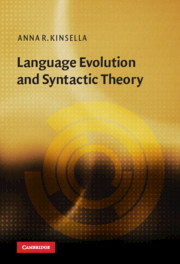Book contents
- Frontmatter
- Contents
- List of figures
- List of tables
- Preface
- List of abbreviations
- 1 Constraining our theory of language
- 2 Language as a perfect system
- 3 Language as an evolvable system
- 4 Language as a recursive system
- 5 Language as a minimal system
- 6 Towards an evolvable theory of syntax
- Bibliography
- Index
2 - Language as a perfect system
Published online by Cambridge University Press: 30 September 2009
- Frontmatter
- Contents
- List of figures
- List of tables
- Preface
- List of abbreviations
- 1 Constraining our theory of language
- 2 Language as a perfect system
- 3 Language as an evolvable system
- 4 Language as a recursive system
- 5 Language as a minimal system
- 6 Towards an evolvable theory of syntax
- Bibliography
- Index
Summary
Introduction
In this chapter I take up the first of the evolutionary issues posed at the end of chapter 1: the importance of the notion of perfection in minimalist theories of language. The concept is particularly interesting from the evolutionary viewpoint for one because perfection appears initially to be consonant with the process of adaptation – reaching towards an ever more optimal solution – and at the same time as it has often been argued that that which arises through the typical processes of evolution is never perfect. The path the investigation here will take is to determine which of these perspectives is on target.
The perfection of language
Theorising in the generative enterprise in the last decade has led to a conception of language that is quite substantially altered from previous theories in this tradition. The MP, according to Chomsky, is a framework for considering language from a different viewpoint, and that is to look at language as a system which is in some way perfect for the job it needs to do: ‘[T]he Minimalist Program … is … a research program concerned with … determining the answers to … the question “How ‘perfect’ is language?” ’(Chomsky 1995b: 221).
Two main issues present themselves here. Firstly, what is meant by ‘perfection’? That is, how can we determine if any system is ‘perfect’; what type of properties and features would this entail for the system? Secondly, for what is language ‘perfect’? In other words, a system can only be considered perfect in relation to some function it has; as Pinker and Jackendoff (2005: 225) put it: ‘nothing is “perfect” or “optimal” across the board but only with respect to some desideratum’.
Information
- Type
- Chapter
- Information
- Language Evolution and Syntactic Theory , pp. 39 - 69Publisher: Cambridge University PressPrint publication year: 2009
